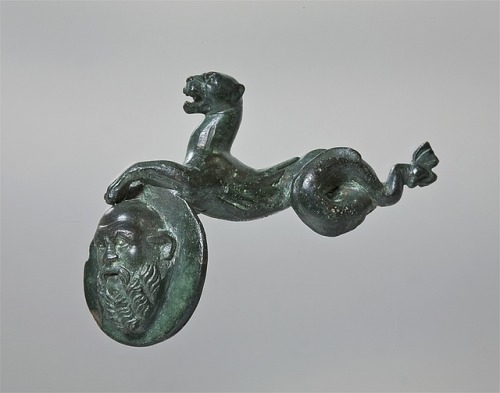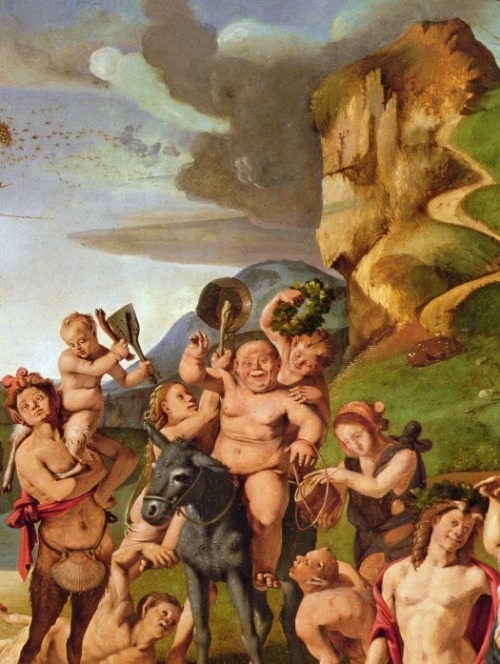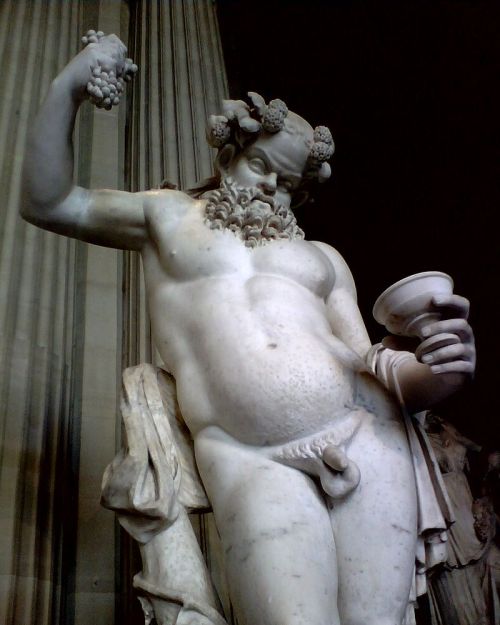#silenus
Decorative piece in the shape of a sea-panther-monster holding a shield with a Silenus mask
Image from the Thorvaldsen Museum via their online collection:H212
Post link
Why February 19th is BRILLIANT
Drink to the Future
Well, today has been difficult. We have spent most of the day researching a person only to find that Wikipedia had lied to us about a date. Never mind, we didn’t really like him anyway. But, by happy chance we’ve also spent part of the day talking with a friend about a character from Greek Myth called Silenus. He was much more fun, so we’re going to tell you about him instead.
Silenus was the foster father, companion and tutor of Dionysus, the Greek god of wine. His origins seem to be very old indeed. He has no mother but Gaia, the earth herself, and sprung fully-formed out of the ground. He’s a sort of man of the forest, who is sometimes described as having the ears, tail and perhaps legs of a horse. You can often see him in paintings of Dionysus and his companions. The one thing you need to know about Silenus, is that he is always drunk. So drunk that he can’t really walk very well. He will be the one sitting on a donkey, falling off a donkey, being supported on a donkey by some satyrs or generally being held up by someone.
Remarkably, he is also very wise. When intoxicated, which as we mentioned is all the time, he possesses special knowledge and the power of prophecy. His favourite things are wine, music and sleep. If you can catch him sleeping and surround him with flowers or chains, he would be under your spell and he might sing for you, tell you a story or foretell your future. That is probably how he came to be at the court of King Midas. Either Midas tempted him with a fountain full of wine, so that he drank it and went to sleep, or some shepherds found him, put a crown of flowers on him and brought him to the king.
For five days, Silenus entertained the king and his court with stories. He told them about a vast continent, far beyond the known world that was peopled by happy and long lived giants, who by the way enjoyed an excellent legal system. Once, ten million of them had sailed to our lands but they thought it wasn’t very nice, so they went back again. He told them of a giant whirlpool that no traveller may pass and of two streams nearby. There were fruit trees on the banks of the streams. By one stream, the fruit made people weep and pine away, but eat the fruit on the bank of the other and your youth would be renewed. In fact, you would start living your life backwards, getting younger and younger, until you finally disappeared. Silenus wasn’t keen to tell Midas his fortune though. After being plagued about it for quite some time he said: “… why do you compel me to tell you those things of which it is better you should remain ignorant? For he lives with the least worry who knows not his misfortune…” he went on to say he thought it was better for humans not to be born at all. Actually, we all know what was going to happen to Midas. When Dionysus caught up with his friend, he was so grateful to the king for looking after Silenus, that he offered Midas any gift he would like. Midas chose the gold thing. It did not go well.
Euripides, a playwright from the fifth century BC, wrote a play called ‘Cyclops’ which is a sort of burlesque on Homer’s Odyssey. When Odysseus arrives on the island of the Cyclops, Silenus and his satyrs are already there, captives of the giant. The story is basically the same but a lot more chaotic. There is a bit where the Cyclops is so drunk that he takes Silenus off to his cave because he thinks he is a beautiful young boy. Silenus also claimed that he helped out at a battle between the gods and a race of giants who lived on the earth long ago. He slew the giant Enceladus and frightened the rest of the giants away with his braying donkey. Cyclops is the only surviving Greek play that is neither a comedy or a tragedy, but a satyr. As far as we can tell it’s almost exactly like a tragedy, except with a bunch of hairy satyrs in the chorus making it silly and rude.
Post link

Gruppo del Sileno by Jean-Baptiste Boudard, Parco Ducale, Parma, 1760
//My photo//

The Triumph of Silenus, Gerard van Opstal, ca. 1660



